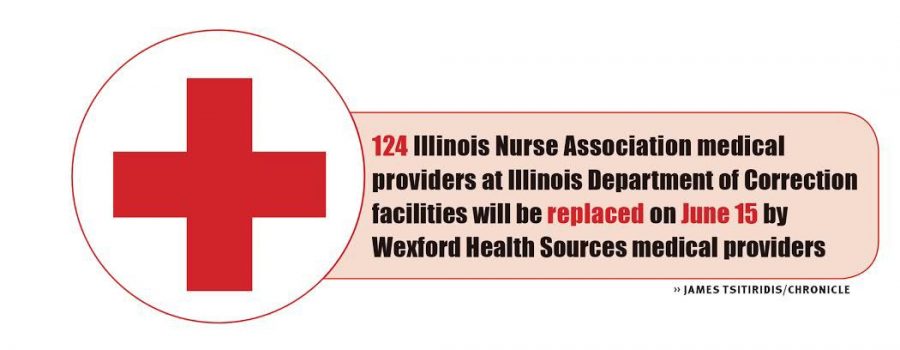Contract disputes could lead to nurses losing benefits
Contract disputes could lead to nurses losing benefits
April 3, 2017
One hundred twenty-four unionized state-employed correctional nurses are set to lose their jobs June 15.
Wexford Health Sources, a Pennsylvania-based private correctional health care provider, will subcontract the vacant nursing positions at 12 Illinois prisons, according to a March 18 letter from the Illinois Department of Corrections to the union.
According to Alice Johnson, executive director of the Illinois Nurses Association, the nurses’ union, contract negotiations between them and the state have been in dispute for more than a year, and the INA has received numerous notices that IDOC was considering subcontracting the nurses’ positions.
Johnson said she felt angry on behalf of the nurses when she received the letter, and IDOC assumes the INA nurses are going to work for Wexford. However, Wexford pays less and offers fewer benefits, such as pensions, she added.
“We have nurses who are nearing retirement that are having the rug pulled out from under them after years of state service,” Johnson said. “[IDOC] is telling these nurses, ‘Well, you’ll be doing the exact same job for less pay and no benefits.’ It’s fundamentally unfair.”
Currently, Johnson said there are 124 nurses working for IDOC and eight in the Illinois Department of Juvenile Justice of the 3,500 nurses represented by INA.
Johnson said IDOC inmates could also be harmed because the state is understaffed with correctional nurses, and the vendor replacing the 124 INA nurses has been accused of improper care.
The Uptown People’s Law Center filed a lawsuit against the state and Wexford in 2010, which is currently pending, stating they have failed to provide inmates with proper medical assistance and violated the Eighth Amendment, which prohibits cruel and unusual punishment, said Alan Mills, legal director of UPLC.
The state disputes that characterization of Wexford.
“The department is confident that Wexford medical professionals will continue to provide adequate medical services to the 42,000 offenders in IDOC custody,” said Nicole Wilson, an IDOC spokeswoman, in a March 29 email.
Wilson said Wexford has been providing medical services for IDOC for nearly 25 years and is prepared to fill the 124 nursing positions. IDOC will work nurses who wish to remain employed with the state and will coordinate with Illinois Central Management Services to identify nursing vacancies within other state agencies, she added.
Wexford did not respond to email and phone requests for comment as of press time.
Wilson said IDOC has more than 1,000 medical providers through Wexford, and fewer than 200 are state employed. Subcontracting the 124 positions will save the state $8 million annually, she added. Employing nurses through the state has led to millions of dollars in overtime pay: $1.4 million in fiscal year 2014, $1.6 million in fiscal year 2015 and $1.7 million in fiscal year 2016.
Mills said he thinks it is a false economy.
“You get what you pay for,” he said. “What you’re going to get is lower quality medical care.”
Mills said medical care for inmates in Illinois is “terrible” because of insufficient funding, and it is “absurd” to suggest too many tax dollars go toward those services. He added that he was “horrified” when he learned about the layoffs because Wexford does not fill the positions it is contracted for by IDOC.
“It seems to [UPLC] that the stability of the [IDOC health care] system was provided by the state employed nurses,” he said.
Johnson said Wexford’s lawsuits make the state’s efforts to privatize state services to save money counterproductive.
“If the state is subject to lawsuits [from patients], that hurts Illinois taxpayers,” Johnson said. “If the state is paying for services they are not receiving, that is not a smart financial decision.”
That 124 nurses would be rehired for the same job but with lower pay and benefits is “unconscionable,” said State Sen. Linda Holmes, D-Aurora, who is a chief co-sponsor of Senate Bill 19, which would prohibit the privatization of state-employed nurses.
The bill passed the Senate March 29, 40-15, and has moved to the Illinois House for consideration, according to Illinois legislation records.
Holmes added that the pending lawsuit should raise a “red flag,” and the IDOC should reconsider Wexford as a subcontractor.
Johnson said INA has filed four unfair labor practice complaints against the IDOC because the state has failed to negotiate with the union on a new contract and provide financial data for those negotiations. IDOC has been uncooperative in meeting with INA, she added.
However, the letter stated INA declined to multiple meeting invitations by IDOC.
Citing a December 2014 study conducted by several medical experts on health care services in Illinois correctional facilities, Johnson said an inmate under Wexford care was neglected after repeated requests for help after suffering paralysis in the lower half of his body.
The inmate was left in the infirmary for two weeks and was discovered to have leukemia. This is an example of the corporate agenda, she added.
“Wexford is driven by a profit motive and ultimately, that’s not good for patient care,” Johnson said. “When you have people looking at the bottom line instead of focusing on patient care, that’s from the corporation.”








